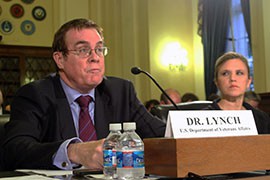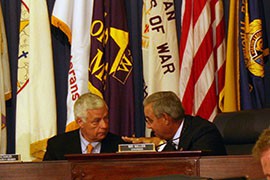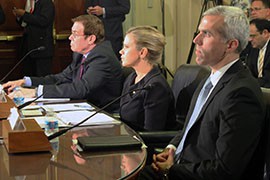Cronkite News has moved to a new home at cronkitenews.azpbs.org. Use this site to search archives from 2011 to May 2015. You can search the new site for current stories.
Lawmakers blast VA officials as report finds problems in Phoenix
WASHINGTON – A House committee subjected Department of Veterans Affairs officials to a two-and-a-half-hour barrage of questions Wednesday about waiting lists and veteran deaths at the agency’s medical facilities.
Members of the House Committee on Veterans Affairs relentlessly questioned the three VA officials over what they called the agency’s unwillingness to give up “emails, documents and notes” about waiting lists for veteran care – and allegedly sham lists meant to make the agency’s response times look better.
“Ma’am, veterans died,” said Rep. Jeff Miller, R-Fla., the committee chairman, to one of the witnesses. “Get us the answers please.”
The hearing came one week after the panel threatened to subpoena VA officials who declined to show up for a hearing last week to answer questions about the agency’s Phoenix facilities. And it came just hours after a preliminary inspector general’s report on the Phoenix Health Care System confirmed “significant delays in access to care” that had affected the quality of care to veterans there.
The report cautioned that the investigation is still ongoing and many allegations remain just that – allegations. But it also said that auditors on the ground and an inspector general’s hotline “received numerous allegations daily of mismanagement, inappropriate hiring decisions, sexual harassment and bullying behavior” by VA managers during the time at the Phoenix facility.
The report did not come to any conclusions about whether delays in scheduling a medical appointment “resulted in a delay in diagnosis or treatment, particularly for those veterans who died while on the waiting list.” But it did say auditors found that 1,700 veterans in the Phoenix area were not on any waiting list for care at all, official or unofficial.
Of those who were on waiting lists, the report sampled 226 and found that they had waited an average of 115 days for their first primary care appointment in the VA system. The Phoenix facility had reported that those same vets had only had to wait an average of 24 days for an appointment, with most waiting less than two weeks.
Concerns raised in Phoenix have spread to other VA facilities, as has the inspector general’s probe, which said it “confirmed that inappropriate scheduling practices are systemic throughout” the Veterans Health Agency.
“Our reviews have identified multiple types of scheduling practices that are not in compliance with VHA policy,” the report said. “These additional lists may be the basis for allegations of creating ‘secret’ lists.”
The findings sparked calls Wednesday for the resignation of VA Secretary Eric Shinseki from Sen. John McCain, R-Ariz., and Rep. Matt Salmon, R-Mesa, and Ron Barber, D-Tucson – as well as members of the Veterans Affairs Committee during Wednesday evening’s contentious hearing. Rep. Doug Lamborn, R-Colo., said that whether Shinseki knew about what was going on or not, “these violations shouldn’t have happened on his watch.”
Committee members grilled Joan Mooney, the assistant VA secretary for congressional affairs, Michael Huff, a congressional relations officer, and Dr. Thomas Lynch, the assistant deputy undersecretary for health for clinical operations and management.
Miller became obviously irritated as Mooney read written responses when he asked if she thought the agency had complied with an earlier committee subpoena to provide information and correspondence relating the the waiting lists in the Phoenix facility.
“Our goal is to be open and transparent,” Mooney said at one point.
“You say that every week,” said Miller. “We can’t do our job appropriately if you don’t supply us with the documents we request.”
The committee earlier this month subpoenaed VA documents and emails having to do with waiting lists and secret lists that could have led to the deaths of veterans.
When the agency delivered just a few hundred emails, the committee asked VA officials to testify last week, but the officials said they did not have enough time to get to the hearing. That sparked another subpoena to compel the appearance of the witnesses Friday if they failed to show up at Wednesday’s hearing.
During hours of questioning, Lynch tried to assure committee members that the VA is working on the problems.
“A process has been in place, medical centers have been asked to identify patients who have been placed on waitlists,” he said, when asked how the agency is handling veterans across the country right now.









